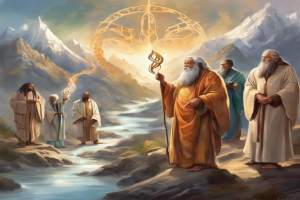Islamic theology emphasizes a profound and unifying concept: all prophets sent by Allah delivered a consistent and singular message. This message was to worship Allah alone and to live righteously according to His guidance. The Quran and the Sunnah (the teachings and practices of the Prophet Muhammad, peace be upon him) provide numerous evidences supporting this assertion.
Quranic Evidence of a Unified Message
The Quran, the final revelation in Islam, underscores that all prophets shared a common mission. Surat Al-Anbiya (21:25) clearly states: “And We sent not before you any messenger except that We revealed to him that, ‘There is no deity except Me, so worship Me.'” This verse explicitly conveys that the central theme of monotheism (Tawhid) was consistently preached by every prophet. The essence of their message was the exclusive worship of Allah, rejecting any form of polytheism or idolatry. Another powerful verse reinforcing this idea is found in Surat An-Nahl (16:36): “And We certainly sent into every nation a messenger, [saying], ‘Worship Allah and avoid Taghut (false deities).'” Here, Allah confirms that the core directive given to all messengers was to guide their people towards the worship of Allah alone and to shun false gods. This recurring directive across different nations and times highlights the universality of their message. Furthermore, Surat Al-A’raf (7:59-65) narrates the stories of Noah, Hud, Salih, and other prophets, each conveying a similar call to their people: “We had certainly sent Noah to his people, and he said, ‘O my people, worship Allah; you have no deity other than Him…'” This consistent narrative across multiple prophets illustrates the continuity of the divine message through different eras and civilizations.
Prophetic Traditions Supporting the Unified Message
The Hadith literature, which documents the sayings and actions of the Prophet Muhammad (peace be upon him), also affirms this unifying concept. In Sahih Bukhari, the Prophet Muhammad (peace be upon him) said: “The prophets are paternal brothers; their mothers are different, but their religion is one.” This metaphor indicates that while the prophets might have come from different backgrounds and faced unique challenges, their fundamental message remained the same. They all called people to the worship of one God and adherence to His commands. Additionally, in a famous hadith narrated by Abu Huraira, the Prophet Muhammad (peace be upon him) stated: “I am the closest of all the people to Jesus, the son of Mary, in this world and the Hereafter.The prophets are paternal brothers; their mothers are different, but their religion is one.” This reiteration not only underscores the shared message of the prophets but also highlights the special bond and mutual respect among them, recognizing their collective mission.
Theological Implications of a Unified Message
The concept of all prophets delivering a single, unified message carries profound theological implications. It reinforces the idea of a singular divine truth, transcending time and space. This unity of message fosters a sense of continuity and coherence in the divine plan, as Allah’s guidance is seen as a seamless thread woven through human history. Moreover, this concept emphasizes the universality of Islam. By affirming that the message of Islam is the same message delivered by all previous prophets, it positions Islam as a continuation and culmination of all earlier revelations. This promotes a sense of inclusivity and respect for all previous prophetic traditions within the Islamic faith.
Conclusion
The Quran and the Sunnah provide unequivocal evidence that all prophets conveyed one core message: the worship of Allah alone and the rejection of idolatry. This consistent theme highlights the unity of divine guidance across different times and cultures. The theological implications of this unified message underscore the continuity of Allah’s plan for humanity and the universal nature of His guidance. By acknowledging and respecting the teachings of all prophets, Islam presents itself as the final and comprehensive embodiment of a timeless truth.



